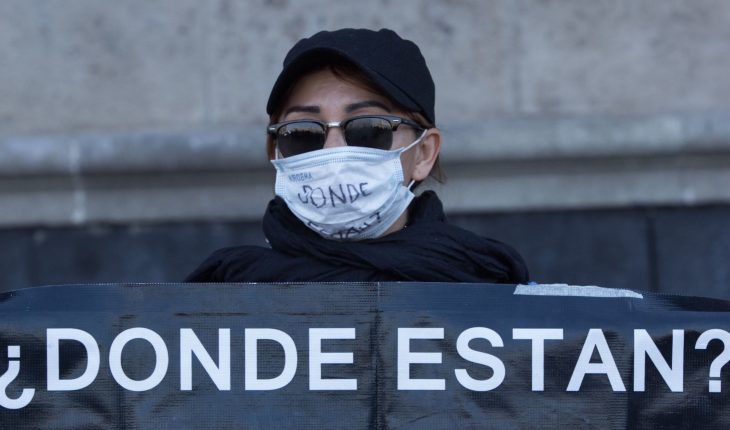The First Chamber of the Supreme Court of Justice of the Nation (SCJN) will discuss on Wednesday a draft ruling ingesting that the authorities in Mexico are obliged to take urgent search and investigation actions ordered by the United Nations Committee against Enforced Disappearance.
You may be interested: The search for missing persons in Mexico is not stopped by coVID-19
This project is the result of the review of a protection promoted by the families of six young people who have disappeared since 2013 in Veracruz against the refusal of the State Prosecutor’s Office, endorsed in the first instance by a federal judge, to attend the actions ordered by the said Committee.
Those affected appealed to the committee in 2017 in despair of the lack of results in an investigation that, seven years later, has not found the probable perpetrators or located the missing. In other words, it keeps cases totally unpunished.
In response, the committee issued more than a dozen urgent actions to the Public Prosecutor’s Office in all cases, including giving them full access to family investigations and incorporating their evidence and lines of inquiry. But all of this is pending because local authorities have litigated so as not to recognize international jurisdiction.
In 2018, on the initiative of the current president of the SCJN, Arturo Zaldívar, the highest court attracted the case to analyze it because of the significance of the definition of whether or not Mexico should honor the determinations of an international body such as the Committee against Enforced Disappearance.
In this context, the project to be voted on this week in charge of the presentation of Minister Alfredo Gutiérrez Ortiz Mena concludes that the Constitution in Mexico recognizes international conventions and human rights treaties as part of the legal framework that prevails in our country, so the provisions that emanate from it are binding.
“To assume that urgent action does not establish obligations by the responsible authorities, nor do they imply the need to communicate the results, is to detract from the tion of the International Convention for the Protection of All Persons from Enforced Disappearance, unreasonably diminish the sphere of protection of persons subject to the jurisdiction of the Mexican State, and contradict the Mexican government’s determinations , who not only adopted, ratified and incorporated into their legal regime,” the project states.
According to the civil human rights organization I(DH)EAS, which has accompanied the affected families, if this draft of the Court were approved, the benefit would extend beyond the six victims who promoted the protection. There are currently almost 400 cases with urgent action issued by the Committee.
Mexico is, in fact, the second country in the world with the most urgent actions issued by the United Nations Committee against Enforced Disappearance, behind only Iraq.
Home Forming: Seven Years of Impunity
Daniel, Karlo, Luis, Julian, Emiliano and Hector disappeared in December 2013. All of them were neighbors of the colony Formando Hogar, a popular neighborhood of the port of Veracruz.
As in so many other cases that occurred during Javier Duarte’s rule, elements of the state police were involved in his disappearance who, according to witnesses, took the six young people in detention. That was the last time anyone could see them.
Although the families immediately tried to report the facts, the Public Prosecutor’s Office asked them to wait 72 hours for young people to be considered truly missing. That was the first of many irregularities and negligence that would follow in the years following this case.
In the absence of results, and with the support of the organization I(DH)EAS, relatives came before the United Nations Committee against Enforced Disappearance which, in February 2016, ordered the Mexican authorities to implement a series of urgent actions to expedite the search for the missing, and the identification of the likely perpetrators. A year later these actions were repeated and extended.
Among the committee’s order is, for example, a comprehensive search process and a serious investigation to find the whereabouts of the victims; take into account the possible involvement of police officers of all levels and military in the case; and expedite the identification of remains found in clandestine pits.
The Prosecutor’s Office was also instructed to account to family members of the strategy implemented for the search for missing persons, as well as to allow them access to the findopen pre-office and all the progress of the case. All this in addition to informing the United Nations committee on compliance with the provisions.
But there was no case. The State Prosecutor’s Office refused to take such urgent action, which is why relatives promoted a lawsuit in federal court in Veracruz against the Attorney General, the holder of the Specialized Prosecutor’s Office for the Search for Missing Persons, and the Public Prosecutor’s Office agents involved.
On 15 May 2018, the judge decided to support the relatives, but only for the purposes of the MP agents responsible for the case expedited the proceedings. However, the judge refused to recognize the Mexican authorities’ obligation to take urgent action by the United Nations, nor did it hold the State Attorney General liable for negligence.
In this context, family members and their lawyers challenged the judge’s decision, prompting the case to be turned to federal court and eventually attracted to the Supreme Court.
Meanwhile, investigations into the disappearance of Daniel, Karlo, Luis, Julian, Emiliano and Hector remain stalled, with no more than seven years away their whereabouts are known and no detainees.
Read more: Missing in Mexico: ‘I found my son in a clandestine pit that I went through myself’
The Court’s arguments
Minister Ortiz Mena’s draft to be put to a vote in the First Chamber on Wednesday concludes not only that Mexico is obliged to up to the provisions of the United Nations Committee against Enforced Disappearance, but that the highest officials of the State Public Prosecutor’s Office are also responsible for the impunity prevailing in the case.
Contrary to the judge’s decision, the draft highlights that both the Attorney General of the State, as well as the Specialized Prosecutor for the Search for Missing Persons, are, by line of command, responsible for the cases and cannot detach themselves from the failures of their subordinates.
“If the district judge found that there was an investigation that did not meet the national and international standards that were developed in the amparo judgment and that the search for young Emiliano had not been undertaken with the necessary urgency, these omissions are undoubtedly attributable to the officials of the entities responsible for the indegatory function of the State, at all levels, and the granting of the protection must, of course, be extended to those authorities,” the project says.
With regard to the urgent actions ordered by the United Nations Committee against Enforced Disappearance, Minister Ortiz Mena’s draft recalls that the Court has previously pointed out that the Mexican State, in ratifying international treaties, is in contracting obligations to the international community. These are provisions that cannot be ignored, and which are at the level of constitutional obligations themselves.
In this context, the urgent actions of that committee are framed, which are binding on Mexico, i.e. it is mandatory to observe and address them. But even in the case of issues of enforced disappearance, a crime against humanity and convicted by multiple international organizations of which Mexico is also a part.
“This Chamber has no doubt as to the mandatory urgent actions issued by the Committee against Enforced Disappearance (…) These actions, their compliance and judicial supervision of such compliance give specific content to the obligation of the State to guarantee the right of persons not to be subjected to enforced disappearance and the obligation to search and location a missing person”, concludes the project.
What we do at Animal Politics requires professional journalists, teamwork, dialogue with readers and something very important: independence. You can help us keep going. Be part of the team.
Subscribe to Animal Politics, receive benefits and support free journalism.#YoSoyAnimal
translated from Spanish: Court to have Mexico take action ordering UN to disappear
April 21, 2021 |





